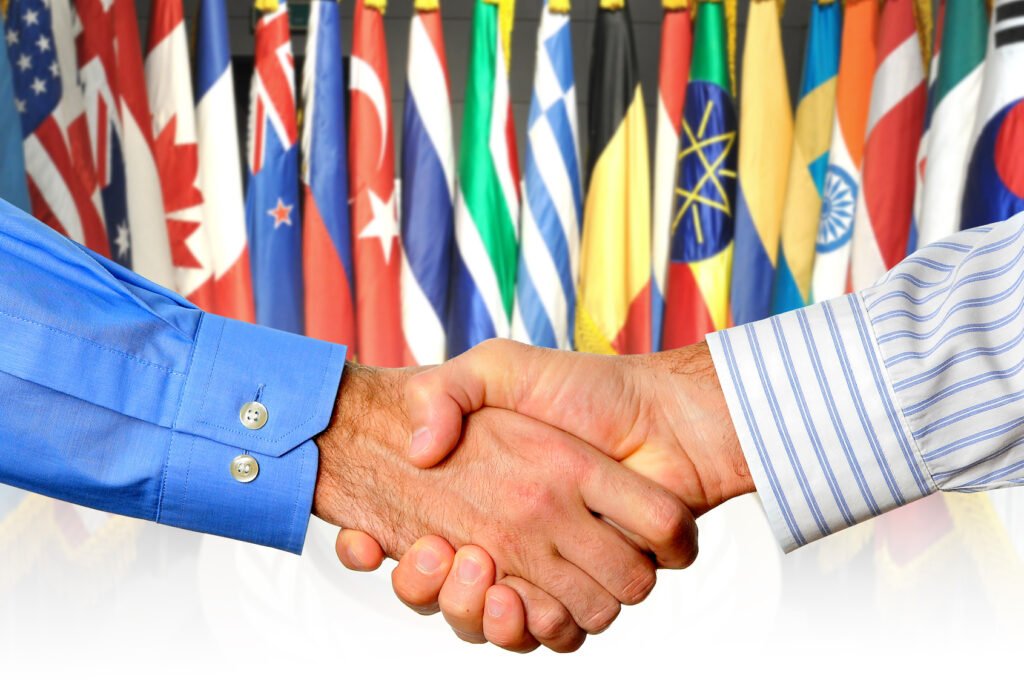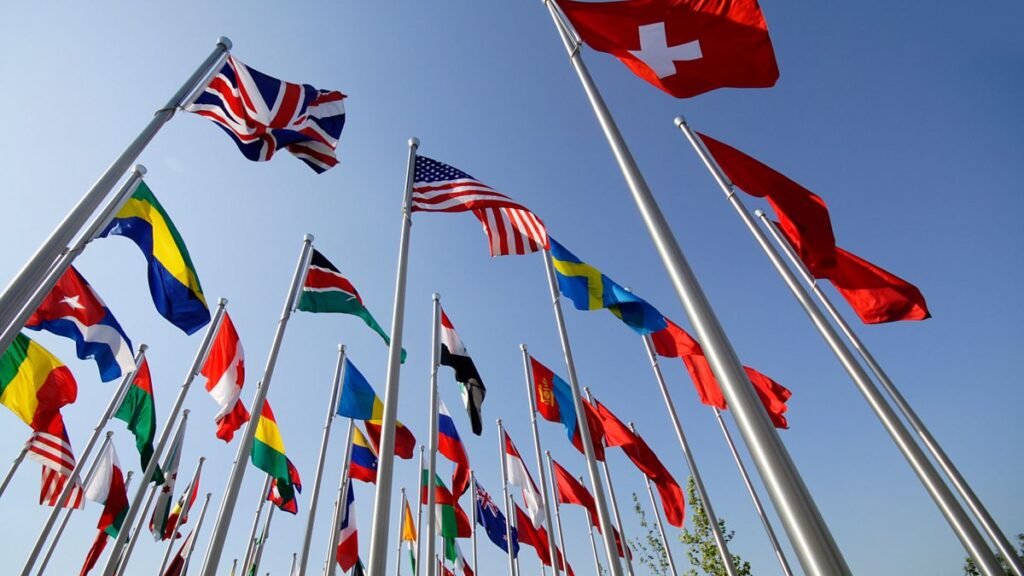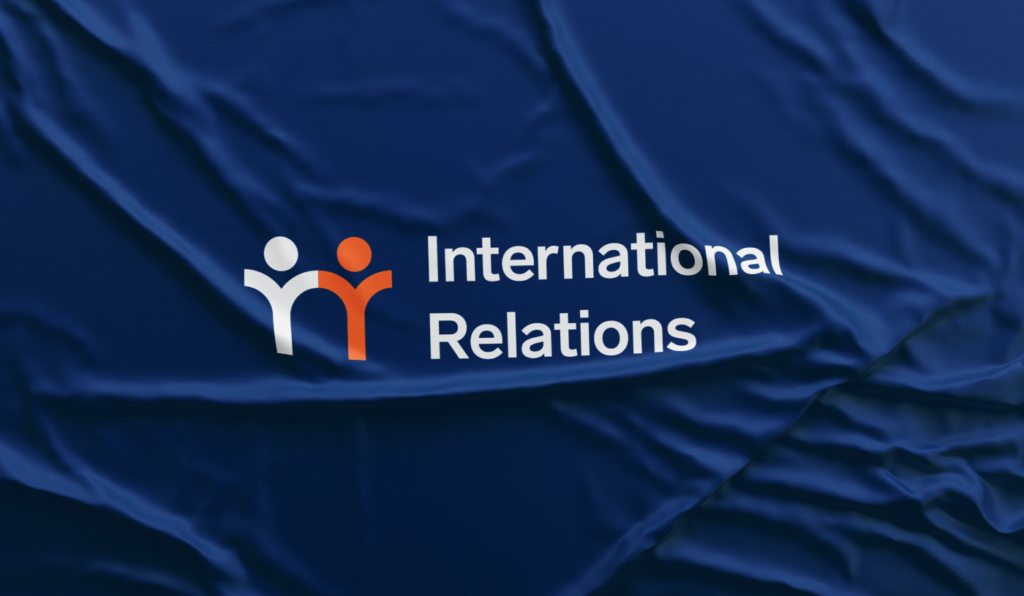Introduction to International Relations
International relations is an academic discipline that explores the interactions among states, international organizations, non-state actors, and geographical entities on the global stage. This field encompasses the study of diplomatic relations, geopolitics, and the complexities of global governance, forming the backbone of our understanding of how countries cooperate and compete within the international system. International relations is essential in a world that is increasingly interconnected, where local events can have global implications.
The significance of international relations cannot be overstated. In today’s globalized world, understanding international dynamics is crucial for addressing pressing issues such as climate change, terrorism, human rights, and economic disparity. Diplomacy, as a critical component of international relations, involves negotiations and conflict resolution strategies that shape bilateral relations and multilateral agreements. These diplomatic efforts help manage the intricacies of trade agreements and international security frameworks that govern interactions among states.
Various actors play vital roles within the sphere of international relations. Nation-states remain the principal players, possessing sovereignty and the ability to project power. However, international organizations such as the United Nations and non-state actors, including multinational corporations and non-governmental organizations, also significantly influence the global landscape. Their actions and policies can affect geopolitics and shift the balance of power, demonstrating that international relations encompass more than just interactions between states.
Overall, the study of international relations provides a framework to navigate the complexities of a world characterized by rapid change, interdependence, and multifaceted challenges. Gaining insights into this discipline is essential for scholars, policymakers, and anyone interested in understanding the continuing evolution of global affairs and the factors that shape state behavior and international collaboration.
Theoretical Frameworks in International Relations
International relations is fundamentally shaped by various theoretical frameworks that seek to explain the dynamics of global interactions. Four primary paradigms stand out: realism, liberalism, constructivism, and critical theory. Each offers distinct perspectives on power, governance, and the nature of state interactions in the geopolitical landscape.
Realism is grounded in the view that the international system is inherently anarchic, with states acting primarily in their own self-interest to secure power and security. Key thinkers such as Hans Morgenthau emphasize the role of military strength and national interest as drivers of state behavior. Realism tends to focus on the pragmatic and often competitive nature of bilateral relations, viewing multilateral agreements as useful only when they serve national interests.
Liberalism, in contrast, posits that cooperation among states can lead to global stability and peace. Figures like Robert Keohane and Joseph Nye argue that international institutions and trade agreements play a vital role in facilitating cooperation, enhancing mutual benefits, and promoting shared values. This theory highlights the importance of multilateralism and diplomatic engagement in avoiding conflict, advocating for frameworks that integrate economic interdependence and collective security.
Constructivism introduces a different angle, emphasizing the social constructs and identities that influence international relations. Thinkers such as Alexander Wendt argue that the interests of states are not fixed but are shaped through social interactions and shared understanding. This perspective underscores the role of norms, culture, and identity in shaping diplomatic behavior and interactions among states.
Critical theory, on the other hand, challenges the traditional paradigms by examining power relations, inequality, and the role of non-state actors in geopolitics. Scholars like Robert Cox highlight how economic and social factors drive power dynamics, advocating for a more inclusive understanding of international affairs. Each of these theoretical frameworks provides valuable insights and critiques, illustrating their strengths and limitations in interpreting contemporary global events.

Key Issues in International Relations
International relations serve as a complex framework that shapes our understanding of global politics and the interactions between nations. Within this framework, several key issues emerge as defining elements of contemporary international relations. One of the most pressing issues is security concerns, which encompass both traditional military threats and newer challenges such as terrorism and cyber warfare. Nations continually reassess their defense strategies and international alliances to address these multifaceted security dynamics, building upon diplomatic channels to strengthen bilateral relations and enhance multilateral agreements aimed at collective security.
Another prominent feature influencing international relations is economic interdependence. As globalization progresses, countries increasingly rely on each other for trade and resources. Trade agreements become pivotal in navigating this interdependence, as they shape economic policies and promote cooperative relationships among nations. However, this economic interconnectedness also raises concerns about vulnerability to external shocks, prompting discussions on how to ensure economic resilience within the realm of geopolitics.
Environmental challenges present an additional layer to the current landscape of international relations. Climate change, biodiversity loss, and resource scarcity require collaborative efforts across nations, emphasizing the importance of international cooperation. Multilateral agreements, such as the Paris Agreement, illustrate the urgent need for comprehensive strategies to address these global threats while balancing national interests. Similarly, human rights issues continue to exert significant influence on international diplomacy, with nations advocating for the protection of human rights as both a moral imperative and a cornerstone of international stability.
Lastly, the impact of technology on diplomacy cannot be overlooked. Advances in communication and data analytics have transformed how states engage with one another, redefining traditional diplomatic practices. Digital diplomacy plays a crucial role in shaping international relations by facilitating real-time dialogue and fostering transparency between nations.
The Role of International Organizations
International organizations play a significant role in the landscape of international relations, facilitating diplomacy and cooperation among nations. Prominent entities such as the United Nations (UN), North Atlantic Treaty Organization (NATO), and the World Trade Organization (WTO) have been instrumental in shaping global geopolitics. These organizations address complex challenges, act as platforms for dialogue, and promote multilateral agreements that transcend national boundaries.
The UN, for instance, is a cornerstone of international relations, providing a forum for conflict resolution, peacekeeping, and promoting human rights and sustainable development. Through various agencies and programs, the UN works towards achieving objectives that align with global cooperation. Its peacekeeping missions have historically played a crucial role in mitigating conflicts and restoring stability in war-torn regions, showcasing its commitment to fostering harmonious bilateral relations among member states.
NATO is another key player, particularly in the realm of collective security. As a military alliance, it ensures that member countries can jointly respond to threats, thus enhancing geopolitical stability in Europe and North America. The reliance on mutual defense has created a framework within which countries navigate their security concerns, thereby bolstering regional alliances and contributing to a more secure international environment.
The WTO focuses on trade agreements and economic cooperation among nations, navigating the complexities of global commerce. By establishing rules and norms governing trade, it promotes healthy economic relationships, which are essential for reducing poverty and promoting sustainable development. Despite its benefits, the WTO faces criticisms regarding its effectiveness in addressing the trade needs of developing countries, thereby raising questions about equity in international relations.
In conclusion, international organizations significantly influence global diplomacy and geopolitics. They serve as mediators in conflict resolution, are dedicated to the promotion of sustainable development, and enhance bilateral relations through multilateral agreements. However, their effectiveness is often scrutinized, necessitating ongoing reforms and adaptations to meet the evolving dynamics of international interactions.
Current Global Trends and Challenges
In recent years, the landscape of international relations has witnessed significant transformations influenced by various factors including geopolitical rivalries, the ascent of multipolarity, and the reinforcement of nationalism. The transition towards a multipolar world order, where multiple states exert influence on global affairs, marks a departure from the previously dominant unipolarity characterized by the unrivaled power of the United States. This shift presents both opportunities and challenges for diplomacy, as emerging powers seek to redefine their roles in international systems.
Geopolitical rivalries, particularly between superpowers, have resurfaced, highlighting tensions that can affect bilateral relations and global stability. The competition for influence, both economically and militarily, has resulted in increased scrutiny of trade agreements and alliances. Multilateral agreements aimed at promoting cooperation among nations are increasingly challenged by unilateral actions, undermining established diplomatic norms. Amidst this complex landscape, nationalism and populism have gained traction, prompting states to prioritize domestic interests over international collaboration, which complicates consensus-building efforts.
Besides these geopolitical dynamics, contemporary challenges such as climate change, cyber warfare, and global health crises introduce urgent issues that require collective action. Climate change represents a pressing concern, demanding that nations engage in sustained dialogue and foster multilateral cooperation to address its impacts effectively. Meanwhile, cyber warfare poses a unique threat to the stability of international relations, necessitating a new framework for diplomatic engagement and legislation to protect critical infrastructure.
As the world navigates these intertwining trends, the future of international relations will depend largely on the ability of states to balance their national interests with the necessity for global governance. Each of these challenges emphasizes the importance of effective diplomacy and collaboration, delineating the pathway for sustainable international relations in a rapidly evolving geopolitical context.
Regional Studies in International Relations
Examining international relations through the lens of specific regions such as the Middle East, Asia-Pacific, Europe, Africa, and the Americas provides critical insights into the unique political, economic, and social dynamics that shape global interactions. Each region possesses its own set of challenges and opportunities that significantly influence the development of diplomatic strategies and bilateral relations.
In the Middle East, for instance, complex historical relationships, conflicts, and resource management have resulted in a unique geopolitical landscape. The interplay of various state and non-state actors, alongside multilateral agreements addressing security and trade, is fundamental to understanding the region’s influence on international diplomacy. Additionally, regional powers often engage in intricate diplomacy to navigate their interdependencies, thereby affecting wider international relations.
Asia-Pacific stands out due to its rapid economic growth and rising geopolitical tensions, particularly influenced by the interactions among major powers like China, India, and the United States. Trade agreements and alliances in this region play a pivotal role in establishing stability and mitigating conflicts. Understanding these dynamics is essential for comprehending the global economic landscape and shifts in international power structures.
Europe, with its rich history of international relations and institutions like the European Union, showcases the importance of multilateralism. The collaboration among member states reflects a commitment to shared diplomatic values, even as challenges such as Brexit and differing national interests complicate the landscape. Similarly, Africa’s diverse political environments and socio-economic conditions command attention, as many countries navigate their international relations through regional organizations and collective bargaining in trade agreements.
Finally, the Americas demonstrate a range of bilateral relations influenced by trade, environmental concerns, and security issues. The interplay between North and South America, particularly in matters of trade cooperation and diplomatic engagement, highlights the region’s pivotal role in global affairs. A nuanced understanding of these regional dynamics is critical for comprehending the broader framework of international relations and its evolving trends.

The Impact of Non-State Actors
In contemporary international relations, the influence of non-state actors has increasingly garnered attention. This category includes a diverse array of entities such as multinational corporations (MNCs), non-governmental organizations (NGOs), and even terrorist groups, each playing a pivotal role in shaping global dynamics. Traditionally, the state-centric paradigm has dominated the study of international relations, emphasizing the role of national governments as the primary actors. However, the integration of non-state actors into this discourse reveals a more complex and multifaceted landscape in geopolitics.
Multinational corporations, for instance, wield significant influence over trade agreements and economic policies, often transcending national borders. Their operations can sway government decisions, particularly in developing nations, where economic dependency may lead to concessions in international negotiations. This economic clout allows MNCs to engage in diplomacy that can impact bilateral relations, sometimes placing them on par with state actors in discussions regarding trade and investment.
Non-governmental organizations also play a crucial role in international relations by promoting humanitarian causes, advocating for human rights, environmental protection, and social justice. Through their actions, NGOs have the potential to shape international policies and pressure states into responsive actions. Their ability to mobilize public opinion and shift diplomatic discussions highlights how non-state actors contribute to governance on a global scale.
Conversely, the emergence of terrorist groups has introduced new challenges to international security and diplomatic efforts. These non-state actors can disrupt stability, instigate conflicts, and influence state behavior, forcing governments to reevaluate their approaches to security and cooperation. As states adapt to these complexities, the dialogue within international relations must also evolve to incorporate the voices and impacts of non-state actors, thereby redefining traditional frameworks of power and influence.
Future Directions in International Relations
The landscape of international relations is continuously evolving, influenced by a multitude of factors that reshape the dynamics of global diplomacy and geopolitics. Emerging technologies, particularly artificial intelligence, possess the potential to significantly alter the mechanisms through which states engage with one another. As AI systems become more integrated into decision-making processes, they can enhance analytical capabilities, allowing policymakers to assess bilateral relations and multilateral agreements with greater precision. However, this also raises concerns about the ethical implications and the need for regulations governing AI in diplomatic contexts.
In tandem with technological advances, we are witnessing a notable shift in power dynamics on the global stage. Powers that were once considered regional leaders are now asserting influence in international forums, challenging the long-standing dominance of traditional superpowers. This shift is prompting a reassessment of existing trade agreements and diplomatic strategies, as nations pursue new alliances and partnerships to navigate a more complex geopolitical environment. These changing dynamics may foster an increase in regional cooperation while simultaneously intensifying competition among emerging powers.
Global governance reform is another critical area that may shape the future of international relationships. As challenges such as climate change, pandemics, and cybersecurity threats transcend national borders, there is a growing consensus on the necessity for enhanced multilateral cooperation to address these issues effectively. This could entail reforming existing international institutions or creating new platforms for dialogue and collaboration, particularly geared towards conflict resolution and sustainable development.
Ultimately, the future of international relations will depend on how states adapt to these emerging trends and manage the delicate balance between competition and cooperation. The ability to navigate this evolving landscape will determine not only national security but also the prosperity and stability of the international community as a whole.

Conclusion: The Importance of Understanding International Relations
In today’s increasingly interconnected world, the study of international relations has become crucial for understanding global dynamics. As countries engage in diplomacy and negotiate bilateral relations, the implications of these interactions reach beyond national borders. The complexities of geopolitics are influenced by a myriad of factors, including economic interests, cultural exchanges, and security concerns, all of which play a significant role in shaping international policies and responses.
Furthermore, the significance of multilateral agreements cannot be overstated. These agreements often serve as frameworks for cooperation among nations, addressing critical issues such as trade, climate change, and security. Engaging in such diplomatic efforts allows countries to navigate global challenges collaboratively, demonstrating that informed engagement is vital for maintaining peace and promoting prosperity. Policymakers, therefore, must be well-versed in the principles of international relations to make sound decisions that consider both domestic and global impacts.
The relevance of understanding international relations extends beyond those in government or academia; ordinary citizens also benefit from being aware of international developments. As the globalized landscape continues to evolve, recognizing the interconnectedness of diverse nations is essential for informed public discourse. Informed citizens can better advocate for policies that support effective diplomacy and international cooperation, thus contributing to a responsible global narrative.
In conclusion, as we navigate the complexities of contemporary geopolitics, an appreciation for the nuances of international relations is essential. Engaging with these concepts empowers all individuals to comprehend the intricate web of global interactions, reinforcing the need for collective efforts in addressing shared challenges. By fostering a better understanding of these dynamics, we can work towards a more harmonious and resilient international community.